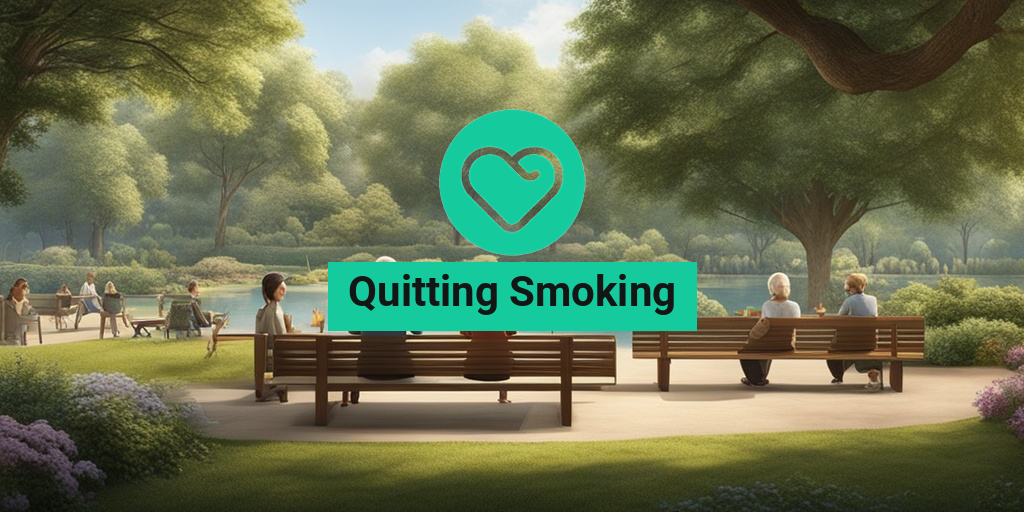“`html
What Is Quitting Smoking?
Quitting smoking refers to the process of stopping the use of tobacco products, particularly cigarettes. This decision is often motivated by a desire to improve health, save money, or enhance overall quality of life. For many, the journey to becoming smoke-free can be challenging, but it is a crucial step towards better health and well-being.
The Journey to Becoming Smoke-Free
The journey of quitting smoking can vary significantly from person to person. Some individuals may choose to quit cold turkey, stopping all at once, while others may prefer a gradual reduction in their smoking habits. Regardless of the method chosen, the goal remains the same: to eliminate nicotine dependence and the harmful effects of smoking.
Understanding Nicotine Addiction
Nicotine is a highly addictive substance found in tobacco. When a person smokes, nicotine quickly reaches the brain, creating feelings of pleasure and relaxation. Over time, the body becomes dependent on nicotine, leading to withdrawal symptoms when trying to quit. These symptoms can include irritability, anxiety, and cravings, making the quitting process particularly challenging.
Benefits of Quitting Smoking
Deciding to quit smoking can lead to a multitude of benefits, both immediate and long-term. Here are some of the most significant advantages:
Immediate Health Improvements
- Improved Lung Function: Within just a few days of quitting, lung function begins to improve, making breathing easier.
- Better Circulation: Blood circulation improves within weeks, reducing the risk of heart disease.
- Enhanced Sense of Taste and Smell: Many people notice a heightened sense of taste and smell shortly after quitting.
Long-Term Health Benefits
- Reduced Risk of Chronic Diseases: Quitting smoking significantly lowers the risk of developing serious health conditions such as lung cancer, heart disease, and stroke.
- Increased Life Expectancy: Studies show that quitting smoking can add years to your life, with the greatest benefits seen in those who quit at a younger age.
- Improved Mental Health: Many individuals report reduced anxiety and depression levels after quitting smoking, leading to an overall improvement in mental well-being.
Financial Savings
In addition to health benefits, quitting smoking can lead to substantial financial savings. The cost of cigarettes can add up quickly, and by quitting, individuals can redirect those funds towards healthier pursuits or savings. Imagine what you could do with the money saved from not buying cigarettes! 💰
Social and Environmental Benefits
Quitting smoking also has positive effects on social interactions and the environment. Non-smokers often find it easier to engage in social activities without the stigma associated with smoking. Additionally, reducing smoking contributes to a cleaner environment, as fewer cigarette butts and smoke pollution are released into the air.
Support and Resources
Quitting smoking is a significant challenge, but you don’t have to do it alone. There are numerous resources available to help you on your journey. Websites like Yesil Health AI provide evidence-based health answers and support for those looking to quit smoking. Whether you need tips, motivation, or a community of fellow quitters, these resources can be invaluable.
Conclusion
Quitting smoking is a life-changing decision that comes with numerous benefits. From improved health and financial savings to enhanced social interactions, the advantages of becoming smoke-free are profound. If you’re considering quitting, remember that support is available, and every step you take towards quitting is a step towards a healthier, happier life. 🌟
“`

“`html
Common Withdrawal Symptoms
Quitting smoking is a significant step towards better health, but it often comes with a range of withdrawal symptoms that can be challenging to navigate. Understanding these symptoms can help you prepare for the journey ahead and develop effective coping strategies.
What Are Withdrawal Symptoms?
Withdrawal symptoms occur when your body begins to adjust to the absence of nicotine, the addictive substance found in cigarettes. These symptoms can vary in intensity and duration, depending on how long you’ve been smoking and how many cigarettes you typically consume.
Common Symptoms You Might Experience
- Cravings: Intense urges to smoke can strike at any moment, especially during triggers like stress or social situations.
- Irritability: Many people report feeling more irritable or anxious when they first quit smoking.
- Difficulty Concentrating: You may find it hard to focus on tasks, which can be frustrating.
- Increased Appetite: Some individuals experience a surge in appetite, leading to weight gain if not managed properly.
- Sleep Disturbances: Changes in sleep patterns, including insomnia or vivid dreams, are common.
- Coughing and Sore Throat: As your lungs begin to clear out mucus and toxins, you might experience coughing or a sore throat.
- Headaches: Nicotine withdrawal can lead to headaches as your body adjusts.
- Depression or Mood Swings: Emotional fluctuations can occur, making it essential to have support during this time.
While these symptoms can be uncomfortable, they are temporary. Most withdrawal symptoms peak within the first week and gradually subside over the following weeks. Remember, the benefits of quitting smoking far outweigh these temporary challenges! 🌟
Effective Quitting Strategies
Successfully quitting smoking requires a combination of determination, support, and effective strategies. Here are some proven methods to help you on your journey:
1. Set a Quit Date
Choosing a specific date to quit smoking can help you mentally prepare for the change. Mark it on your calendar and commit to it. This gives you a clear goal to work towards and allows you to plan for the challenges ahead.
2. Identify Your Triggers
Understanding what prompts you to smoke is crucial. Common triggers include:
- Stress: Many people smoke to cope with stress. Finding alternative stress-relief methods, such as exercise or meditation, can be beneficial.
- Social Situations: If you often smoke when out with friends, consider avoiding these situations initially or finding non-smoking friends to hang out with.
- Certain Activities: Identify activities that you associate with smoking, like drinking coffee or after meals, and find ways to change your routine.
3. Seek Support
Quitting smoking can be challenging, but you don’t have to do it alone. Consider:
- Support Groups: Joining a support group can provide encouragement and accountability.
- Friends and Family: Let your loved ones know about your decision to quit. Their support can make a significant difference.
- Online Communities: Platforms like Reddit have numerous threads where individuals share their quitting experiences and tips. Engaging with others can provide motivation and insights.
4. Consider Nicotine Replacement Therapy (NRT)
NRT products, such as patches, gum, or lozenges, can help ease withdrawal symptoms by providing a controlled dose of nicotine without the harmful chemicals found in cigarettes. Consult with a healthcare professional to determine the best option for you.
5. Stay Active
Physical activity can help reduce cravings and withdrawal symptoms. Exercise releases endorphins, which can improve your mood and reduce stress. Aim for at least 30 minutes of moderate exercise most days of the week. 🏃♂️💪
6. Reward Yourself
Quitting smoking is a significant achievement, so celebrate your milestones! Use the money you save from not buying cigarettes to treat yourself to something special. This positive reinforcement can help keep you motivated.
Remember, quitting smoking is a journey, and it’s okay to seek help and take it one day at a time. With the right strategies and support, you can overcome the challenges and enjoy a healthier, smoke-free life! 🌈
“`

“`html
Support Systems for Quitting
Quitting smoking is a challenging journey, but having a strong support system can make all the difference. Whether you’re trying to quit for the first time or have attempted before, surrounding yourself with supportive individuals can provide the encouragement and motivation you need to succeed. Here’s how to build an effective support system.
1. Friends and Family
Your immediate circle can be your greatest asset. Let your friends and family know about your decision to quit smoking. Their understanding and encouragement can help you stay committed. Here are some ways they can support you:
- Emotional Support: Having someone to talk to about your struggles can alleviate stress.
- Accountability: Regular check-ins can help you stay on track.
- Celebrating Milestones: Acknowledging your progress, no matter how small, can boost your morale.
2. Support Groups
Joining a support group can connect you with others who are on the same journey. These groups provide a safe space to share experiences, challenges, and successes. You can find support groups through:
- Local Health Organizations: Many hospitals and clinics offer smoking cessation programs.
- Online Forums: Websites like Reddit have communities where you can share your journey and get advice from others who understand what you’re going through.
- Social Media: Platforms like Facebook have groups dedicated to quitting smoking, where members share tips and encouragement.
3. Professional Help
Sometimes, professional guidance is necessary. Consider reaching out to:
- Therapists: They can help you address underlying issues related to smoking.
- Doctors: They can provide resources and possibly prescribe medications to ease withdrawal symptoms.
- Quitlines: Many countries have telephone support services that offer advice and encouragement.
4. Mobile Apps and Online Resources
In today’s digital age, technology can be a powerful ally in your quitting journey. There are numerous apps designed to help you quit smoking by tracking your progress, providing motivational quotes, and offering tips. Some popular options include:
- Quit Smoking Apps: Apps like QuitNow! and Smoke Free can help you monitor your progress and connect with others.
- Online Courses: Websites like Smokefree.gov offer structured programs to guide you through the quitting process.
Quitting Smoking and Mental Health
Quitting smoking is not just a physical challenge; it also has significant implications for your mental health. Understanding the relationship between smoking cessation and mental well-being can help you prepare for the emotional ups and downs that may arise during this journey.
1. Withdrawal Symptoms and Mental Health
When you quit smoking, your body goes through withdrawal, which can lead to various mental health challenges, including:
- Anxiety: Many people experience increased anxiety levels when they stop smoking, as nicotine withdrawal can trigger feelings of restlessness.
- Depression: Some individuals may feel a sense of loss or sadness after quitting, especially if smoking was a long-term habit.
- Irritability: Mood swings and irritability are common during the initial stages of quitting.
2. The Positive Impact of Quitting on Mental Health
Despite the challenges, quitting smoking can lead to significant improvements in mental health over time. Here are some benefits:
- Improved Mood: Many former smokers report feeling happier and more content after quitting.
- Reduced Anxiety: As your body adjusts to life without nicotine, anxiety levels often decrease.
- Better Stress Management: Quitting smoking can lead to healthier coping mechanisms for dealing with stress.
3. Strategies for Maintaining Mental Health While Quitting
To navigate the mental health challenges associated with quitting smoking, consider the following strategies:
- Mindfulness and Meditation: Practicing mindfulness can help you manage stress and anxiety.
- Physical Activity: Regular exercise releases endorphins, which can improve your mood.
- Seek Professional Help: If you’re struggling with mental health issues, don’t hesitate to reach out to a mental health professional.
Quitting smoking is a journey filled with challenges, but with the right support system and a focus on mental health, you can achieve your goal and enjoy a healthier, smoke-free life! 🌟
“`

“`html
Long-Term Health Improvements
Quitting smoking is one of the most significant decisions you can make for your health. The benefits of quitting smoking extend far beyond just the immediate relief from cravings. Over time, your body begins to heal, and the improvements can be profound. Let’s explore some of the long-term health benefits you can expect after you quit smoking.
Cardiovascular Health
One of the first areas to improve after quitting smoking is your cardiovascular health. Within just a few weeks, your heart rate and blood pressure start to normalize. Over the years, your risk of heart disease decreases significantly. In fact, after one year of being smoke-free, your risk of coronary heart disease is cut in half compared to that of a smoker!
Respiratory Benefits
Your lungs are incredibly resilient. After quitting smoking, you may notice improvements in your breathing and lung function. Within a few months, symptoms like coughing and shortness of breath often diminish. Long-term, the risk of developing chronic obstructive pulmonary disease (COPD) and lung cancer decreases dramatically. Studies show that after ten years of not smoking, your risk of lung cancer is about half that of a smoker.
Enhanced Immune Function
Smoking weakens your immune system, making you more susceptible to infections. Once you quit, your immune system begins to recover. This means you’ll likely experience fewer colds and respiratory infections. A stronger immune system also helps your body fight off diseases more effectively, contributing to overall better health.
Improved Mental Health
While many people smoke to cope with stress, quitting can actually lead to improved mental health. Research indicates that former smokers often experience lower levels of anxiety and depression over time. The sense of accomplishment from quitting can boost your self-esteem and overall mood. Plus, you’ll save money that can be spent on activities that promote well-being! 💰
Better Oral Health
Smoking takes a toll on your oral health, leading to gum disease, tooth loss, and bad breath. After quitting, you’ll notice improvements in your oral hygiene. Your gums will heal, and the risk of developing oral cancers decreases. Regular dental check-ups can further enhance your oral health as you embrace a smoke-free lifestyle.
Increased Longevity
Ultimately, quitting smoking can lead to a longer life. Studies show that individuals who quit smoking before the age of 40 can add up to ten years to their life expectancy. Even quitting later in life can significantly reduce the risk of premature death. The earlier you quit, the better your chances of enjoying a longer, healthier life! 🌟
Resources for Smokers
If you’re considering quitting smoking or have already taken the plunge, there are numerous resources available to support you on your journey. Here are some valuable tools and programs that can help:
Quitlines
Many countries offer free quitlines that provide support and guidance for those trying to quit smoking. These helplines connect you with trained counselors who can offer personalized advice and encouragement. Simply call a quitline in your area to get started!
Mobile Apps
In today’s digital age, there are several apps designed to help you quit smoking. These apps often include features like tracking your progress, providing motivational quotes, and offering tips for managing cravings. Some popular options include:
- Quit Genius – A comprehensive program that combines cognitive behavioral therapy with a personalized quit plan.
- Smoke Free – Tracks your progress and shows how much money you’ve saved by not smoking.
- My QuitBuddy – Offers support and encouragement through a customizable experience.
Support Groups
Connecting with others who are also trying to quit can be incredibly beneficial. Support groups, whether in-person or online, provide a sense of community and shared experience. Websites like Reddit have dedicated forums where you can share your journey, seek advice, and find encouragement from others who understand what you’re going through.
Nicotine Replacement Therapy (NRT)
For many, quitting smoking cold turkey can be challenging. Nicotine replacement therapies, such as patches, gum, or lozenges, can help ease withdrawal symptoms and cravings. Consult with a healthcare professional to determine the best option for you.
Professional Counseling
Sometimes, the best way to quit smoking is to seek professional help. Many healthcare providers offer counseling services specifically for smoking cessation. These sessions can provide you with coping strategies and support tailored to your individual needs.
Remember, quitting smoking is a journey, and it’s okay to seek help along the way. With the right resources and support, you can successfully overcome the challenges of quitting and enjoy a healthier, smoke-free life! 🌈
“`

“`html
Frequently Asked Questions about Quitting Smoking
What is the best method for quitting smoking?
There are several effective methods for quitting smoking, including:
- Cold turkey: Stopping all at once without any aids.
- Gradual reduction: Slowly decreasing the number of cigarettes smoked.
- Nicotine replacement therapy: Using patches, gum, or lozenges.
- Prescription medications: Consulting a healthcare provider for medications that can help.
What are the side effects of quitting smoking?
When you stop smoking, you may experience various quitting smoking side effects, such as:
- Cravings for nicotine
- Irritability and mood swings
- Increased appetite and weight gain
- Difficulty concentrating
- Insomnia
These symptoms are typically temporary and will improve over time.
How long does it take to see benefits after quitting smoking?
The quitting smoking timeline benefits can vary, but many people start to notice improvements in their health within days. Here’s a brief overview:
- 24 hours: Heart rate and blood pressure drop.
- 2 weeks to 3 months: Improved circulation and lung function.
- 1 year: Risk of heart disease is cut in half.
- 5 years: Risk of stroke is reduced to that of a non-smoker.
- 10 years: Risk of lung cancer drops significantly.
Can quitting smoking improve my mental health?
Yes! Many individuals report improved mental clarity and mood stability after quitting smoking. While the initial withdrawal can be challenging, long-term benefits include:
- Reduced anxiety and stress levels
- Better overall mood
- Increased energy levels
What support is available for quitting smoking?
There are numerous resources available to help you quit smoking, including:
- Support groups and counseling
- Quit smoking apps
- Hotlines and online forums
- Healthcare providers for personalized plans
Connecting with others who are also trying to quit can provide motivation and encouragement. 😊
Is it normal to feel worse before feeling better after quitting?
Yes, it is common to experience a range of emotions and physical symptoms when you first quit. Many people feel quitting smoking ruined my life during the initial phase, but these feelings usually pass as your body adjusts to being smoke-free.
Can I still smoke weed after quitting smoking?
While some people wonder about quitting smoking weed after stopping tobacco, it’s essential to consider how it may affect your recovery. It’s advisable to focus on maintaining a smoke-free lifestyle to enhance your overall health benefits.
“`




